Centres, groups, chairs and laboratories
CERNEC: Centre de recherche en neuropsychologie et cognition
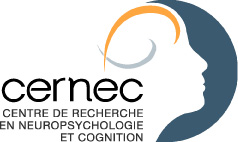
The CERNEC was founded in 1988 and recognized as a research group (GRENE) in 1992 and a FCAR centre in 1994. CERNEC is administered by professors from the Department of Psychology, and currently has 23 regular members. They are professors or research fellows from different university departments in Quebec, whose research themes revolve around brain-cognition relationships.
Interdisciplinary Research Centre on Intimate Relationship Problems and Sexual Abuse (CRIPCAS)
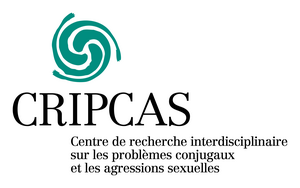
The CRIPCAS is an interdisciplinary consortium of some 20 researchers, a dozen intervention settings and close to 100 students. Located at the Université de Montréal, it brings together 5 other Quebec universities and the INRS. The CRIPCAS is unique in the way its research programs focus on both sexual abuse and intimate relationship problems, and on the interfaces between these 2 issues.
RENARD Team – Research in Knowledge Transfer
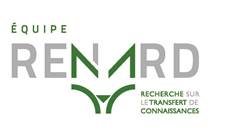
We are the Quebec's first cross-disciplinary group devoted to studying knowledge transfer (KT) in the field of social interventions, specifically with regard to educational, health and community services. The acronym RENARD stands for Recherche sur les effets non-académiques de la recherche et ses déterminants (research into the non-academic effects of research and its determining factors).
Our team consists of researchers and students from a number of Quebec universities who contribute to producing knowledge about KT, as well as from organizations whose mission is or includes KT and from institutions deeply engaged in KT activities in connection with their development objectives.
Mission
The RENARD team was established in order to offer a platform for collaboration that would facilitate encounters between KT researchers and institutions or agencies involved in KT activities. This platform enables such organizations, which are leaders in KT, to profit from the experience of both sides, enrich their respective projects and develop new ones with the help of researchers.
Objectives
To support its mission, the RENARD team has set 2 main objectives:
- Generate scientific knowledge to improve the understanding of knowledge transfer.
- Allow our partners to adopt more effective knowledge transfer strategies to aid decision-making and intervention in their respective areas of practice.
Research Unit on Children's Psychosocial Maladjustment (GRIP)

The GRIP is a group of a multidisciplinary inter-university researchers who contribute to understanding of the development of adjustment problems in children and youths, and to identifying the most effective means to prevent these problems. The group is funded by the Université de Montréal, Université Laval, McGill University and the FQRSC.
Canada Research Chair in Experimental Cognitive Science
Dr. Pierre Jolicoeur, Full Professor
The Chair’s objective is to study human attention and its relation to perception and thinking. Research results will make it possible to better understand how humans react to simultaneous demands for attention.
Canada Research Chair in Cognitive Neurosciences
Dr. Franco Lepore, Full Professor
The Chair’s research aims to better understand the way in which the brain can reroute signals and process information from the senses. The research results will be useful in helping people compensate for sensory damage caused by accidents or disease. Thanks to a non-invasive optical imaging technique, it is now possible to study the cortical organization of young children’s brains.
Canada Research Chair in Neurocognition of Music
Dr. Isabelle Peretz, Full Professor
The work of this chair is to understand how the brain processes music, and learn more about the true nature of musical ability. The research results will be used in fine-tuning therapies that involve music, understanding the role music plays in overall mental development, and learning more about human nature.
International Laboratory for Brain, Music and Sound Research (BRAMS)
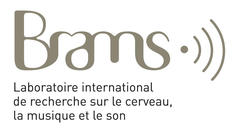
Codirected by Professor Dr. Isabelle Peretz, BRAMS was created in June 2004. It is the brainchild of several Montreal scholars affiliated with McGill, Concordia and the Université de Montréal. The research centre draws on their visions and common interest in understanding the neural substrates of human auditory cognition, and of music processing in particular.
Laboratoire Grandir Ensemble

Directed by Associate Professor Dr. Annie Bernier, Grandir Ensemble is both a lab and a longitudinal research project. It is funded by the Social Sciences and Humanities Research Council of Canada (SSHRC), the Fonds Québécois de Recherche sur la Société et la Culture (FQRSC), and the Fonds de la Recherche en Santé du Québec (FRSQ). Overall, the aim of the research program is to study the influence of the early family environment on individual differences in children's development.
Social Change and Identity Laboratory
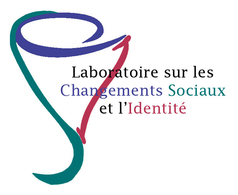
Directed by Associate Professor Dr. Roxane de la Sablonnière, the laboratory looks at the psychological adaptation challenges people face when they are exposed to profound social change. Its research aims to:
- Reconceptualize one of the most influential theories in the field of social psychology, namely the theory of relative deprivation.
- Understand the psychological mechanisms that trigger the identity changes over time.
Research Laboratories on Autonomy Support

Directed by professors Geneviève Mageau and Mireille Joussemet, the laboratories examine the definition, determinants and outcomes of autonomy support in hierarchical relationships in general, and in parent-child relationships in particular.
Since 2007, these laboratories have been heading up the “How To” project, with the aim of evaluating the parenting program entitled How to Talk so Kids Will Listen & How to Listen so Kids Will Talk. The workshop shows parents how to offer their children clear and consistent structure, while supporting their autonomy and maintaining a warm interpersonal relationship.
ABCs Developmental Neuropsychology Laboratory

The ABCs Developmental Neuropsychology Laboratory, established and directed by Dr. Miriam Beauchamp, is located at UdeM’s Department of Psychology and the Ste-Justine Hospital Research Centre. The work of the lab focuses on cerebral, cognitive and social development from infancy, through childhood and adolescence.
Laboratoire d’Étude sur l’Anxiété et la Dépression gÉRiatrique (LEADER)

Directed by Dr. Sébastien Grenier, the Laboratoire d’Étude sur l’Anxiété et la Dépression gÉRiatrique (LEADER) is located at the the Institut universitaire de gériatrie’s research center (CRIUGM). Its objectives are to:
- Better understand and describe late-life anxiety and depression among healthy people or those suffering from chronic/neurological diseases (assessment).
- Test the effectiveness of psychosocial interventions (cognitive-behavioural therapy, or CBT, in particular) in treating late-life anxiety and depression in healthy people or those suffering from chronic physical/neurological diseases (intervention).
Neuroscience of Early Development – NED Lab
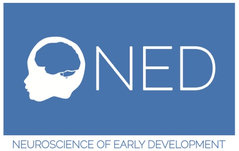
The Neuroscience of Early Development lab is a research laboratory at the Centre hospitalier universitaire Sainte-Justine (hospital). It carries out research into brain development and learning in healthy children and infants. Its researchers also investigate different pathologies and their effects on cerebral, cognitive and affective development, such as epilepsy, leukemia and intellectual disabilities. Investigation methods include structural and functional magnetic resonance imaging, electrophysiology (EEG/MEG) and behavioural measures (eye tracking, neuropsychological evaluations).
The NED lab was founded and is directed by Dr. Sarah Lippé, professor and researcher at the Université de Montréal and the Sainte-Justine hospital research centre.